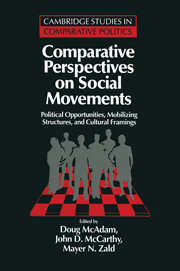 Comparative Perspectives on Social Movements
Comparative Perspectives on Social Movements Book contents
- Frontmatter
- Contents
- Biographical sketches of contributors
- Preface
- Introduction: Opportunities, mobilizing structures, and framing processes – toward a synthetic, comparative perspective on social movements
- PART I POLITICAL OPPORTUNITIES
- PART II MOBILIZING STRUCTURES
- 6 Constraints and opportunities in adopting, adapting, and inventing
- 7 The organizational structure of new social movements in a political context
- 8 The impact of national contexts on social movement structures: A cross-movement and cross-national comparison
- 9 Organizational form as frame: Collective identity and political strategy in the American labor movement, 1880–1920
- 10 The collapse of a social movement: The interplay of mobilizing structures, framing, and political opportunities in the Knights of Labor
- PART III FRAMING PROCESSES
- Notes
- References
- Index
10 - The collapse of a social movement: The interplay of mobilizing structures, framing, and political opportunities in the Knights of Labor
Published online by Cambridge University Press: 05 June 2012
- Frontmatter
- Contents
- Biographical sketches of contributors
- Preface
- Introduction: Opportunities, mobilizing structures, and framing processes – toward a synthetic, comparative perspective on social movements
- PART I POLITICAL OPPORTUNITIES
- PART II MOBILIZING STRUCTURES
- 6 Constraints and opportunities in adopting, adapting, and inventing
- 7 The organizational structure of new social movements in a political context
- 8 The impact of national contexts on social movement structures: A cross-movement and cross-national comparison
- 9 Organizational form as frame: Collective identity and political strategy in the American labor movement, 1880–1920
- 10 The collapse of a social movement: The interplay of mobilizing structures, framing, and political opportunities in the Knights of Labor
- PART III FRAMING PROCESSES
- Notes
- References
- Index
Summary
Failure is an unpopular subject among social movement scholars. Like death and taxes at social gatherings, it is a topic that many of us avoid. In contrast, the birth of insurgency is eagerly debated. As a result, our theories of movement emergence are much more sophisticated and convincing than our models of movement development and decline.
However, while social movement failure is a neglected topic theoretically, in the empirical world it occurs frequently. For example, in his study of American social movements William Gamson (1990) found that over half the organizations in his representative sample failed partially or completely. In light of its frequency, it is important that scholars of social movements begin to construct better theoretical frameworks for understanding the causes and consequences of movement decline.
This chapter contributes to this effort by examining an important failed social movement: the Knights of Labor. The Knights of Labor is an especially significant case, both historically and theoretically. Historically, the collapse of the Knights of Labor was critical in shaping the “exceptionalist” course of the American labor movement (Voss, 1993). Before the collapse of the Knights, the American labor movement developed along lines that were broadly similar to labor movements in England and France. All three originated in the 1830s as movements of skilled craft workers, and all three began, in the last quarter of the nineteenth century, to adopt new inclusive labor ideologies and organizational forms through which less-skilled wage earners were incorporated into the labor movement.
- Type
- Chapter
- Information
- Comparative Perspectives on Social MovementsPolitical Opportunities, Mobilizing Structures, and Cultural Framings, pp. 227 - 258Publisher: Cambridge University PressPrint publication year: 1996
- 45
- Cited by


